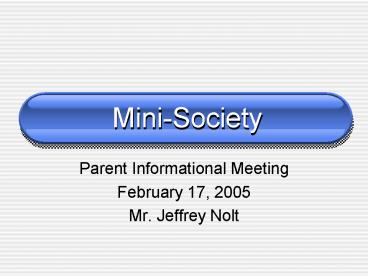MiniSociety
1 / 18
Title: MiniSociety
1
Mini-Society
- Parent Informational Meeting
- February 17, 2005
- Mr. Jeffrey Nolt
2
Tonights Agenda
- Welcome
- Scarcity Activity
- Overview of Mini-Society
- What is it?
- Why this approach?
- Educational Theories
- How parents can help
3
Mini-Society What is it?
Mini-Society is an experience-based instructional
system targeted primarily for teaching
entrepreneurship, economics, and citizenship
concepts to students ages 8 to 12.
4
Mini-Society What is it?
Mini-Society was developed by Dr. Marilyn
Kourilsky. It has been refined over three
decades, and it is in use by teachers and
students in over 43 states. Mini-Society is
endorsed by the U.S. Department of Education.
5
Mini-Society What is it?
In the Mini-Society, students develop an economic
society under the guidance of their teacher.
Children identify business opportunities and
initiate entrepreneurship ventures to provide
goods and services to their fellow citizens.
6
Mini-Society What is it?
Mini-Society is based on the belief that
experience is the best teacher. Instructors are
trained to recognize teachable moments and
debrief students on economic concepts theyve
encountered in their society.
7
Mini-Society What is it?
Mini-Society is NOT a simulation it is a real
experience for students. Thus, students are
highly motivated to learn concrete economic
concepts that affect them today, not abstract
ideas that theyll need to know sometime in the
future.
8
Mini-Society What is it?
When in full swing, students will begin financial
exchanges, form business partnerships, and
encounter the dilemmas confronting members of any
economic system.
9
Why this approach?
- Personal as opposed to vicarious involvement.
- Active as opposed to passive roles.
- Opportunity for decision making, the consequences
of which students will bear.
10
What educational theories shape the program?
- Merlin Wittrock Generative Learning Theory
- John Dewey Experience Based Learning and
Post-Experience Debriefing - Jean Piaget Theory of Cognitive Development
- Benjamin Bloom Blooms Taxonomy of Learning
11
How can parents help?
1. Encourage entrepreneurship in your
child. Help her or him find creative and
innovative ways to make products or services with
little or no money.
12
How can parents help?
2. Insist on fair compensation for materials you
provide . . . and your work. If you help your
child produce goods, negotiate a labor contract.
This may be difficult for you, and your child may
protest. However, you are not a sweatshop worker!
13
How can parents help?
2. Compensation . . . continued. If you give
your child free labor, they cannot accurately
calculate their profit margin. (Profit Income
- labor materials overhead capital)
14
How can parents help?
- 2. Compensation . . . continued.
- How can you be fairly compensated?
- Bartering services
- Allowances
- Mini-Bucks or Silver Dollars
15
How can parents help?
- 3. Spend no more than 10 over the course of
Mini-Society on materials for your child. - This is critical! As much as possible, we want
students to be creative in using low- or no-cost
materials.
16
How can parents help?
- 4. Donate materials to our societies warehouses.
- You can donate supplies for students to buy at
school (see handout). - Your child may negotiate a transportation fee
for carrying the supplies to school, but she or
he doesnt automatically get them.
17
How can parents help?
- 5. Come visit our societies during Market Day.
- What better way to support your child (and spend
the Mini-Bucks or Silver Dollars you might earn
helping your child) than to come and shop at our
stores on a Market Day! - Ill announce the dates/times of Market Days in
advance.
18
What are your questions?































